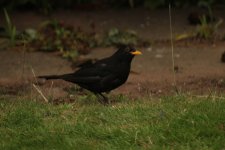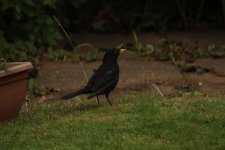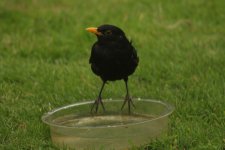iridium-77
Active member
Our resident blackbird seems to have some very minor white patches. Would this be some very, very mild form of albinism? I know there are much more extreme examples, but I've never really noticed an affected one before. Or is he just going through a bit of a dodgy phase that most members of the species do?
He's a spirited little fellow; he doesn't seem to mind us being quite close to him while he's rooting around for food. He's been hoovering up lots of winged ants in the last couple of days. My wife's gotten quite attached to him and has taken to calling him Snowflake (if you knew her, you wouldn't find it odd!)
There's also an adult female and a juvenile living in our hedge. Snowflake is a bit possessive over the food though and tends to spend a lot of time chasing one of them away (not sure which but presume it's the female). Any idea what might be going on there? Just a competition thing? Or maybe it's not his female / offspring?
He's a spirited little fellow; he doesn't seem to mind us being quite close to him while he's rooting around for food. He's been hoovering up lots of winged ants in the last couple of days. My wife's gotten quite attached to him and has taken to calling him Snowflake (if you knew her, you wouldn't find it odd!)
There's also an adult female and a juvenile living in our hedge. Snowflake is a bit possessive over the food though and tends to spend a lot of time chasing one of them away (not sure which but presume it's the female). Any idea what might be going on there? Just a competition thing? Or maybe it's not his female / offspring?






